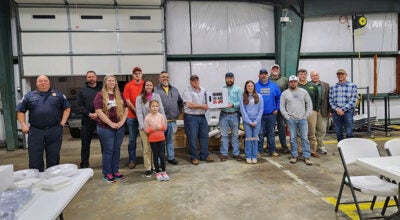Solar farm planned near IP mill
Published 2:20 pm Monday, January 28, 2019

- This is the concept site plan for Ho-Fel Solar Farm on Lees Farm Road in Isle of Wight County.
|
Getting your Trinity Audio player ready...
|
FRANKLIN
Plans for a 55-megawatt, utility-scale solar farm near International Paper’s Franklin mill received a unanimous favorable recommendation from Isle of Wight County’s Planning Commission on Tuesday.
With the Planning Commission’s recommendation, the conditional use permit application of SolarGen of Virginia LLC, a subsidiary of Colorado-based Aquasan, will next head to the county’s Board of Supervisors for a final decision. The permit specifies a 313.78-acre parcel located at 34455 Lees Mill Road, about one mile east of the paper mill, as the site of the proposed solar farm, of which approximately 300 acres would be used. The facility will be surrounded by an 8-foot fence with berms and landscape buffering in place.
“We sent out letters to the neighbors; we have, through those discussions, agreed to double our buffers and more than double our landscaping buffer,” said Page Bolin, a representative of SolarGen. “We will not disturb any area that isn’t already cultivated.”
Bolin added that the Felton family, who owns the land and has farmed in the Western Tidewater area for many years, chose SolarGen as their partner for this project after considering four other companies.
As for where the power generated would go, Bolin said that SolarGen is talking with local businesses, most notably International Paper, and will also look into selling the electricity to local municipalities.
“If we cannot find a buyer locally, we will look for a buyer outside, but we want to sell locally first,” she said.
She explained that while the power would still be sent through Dominion Energy’s grid, were International Paper to enter into a power usage agreement with SolarGen, it would receive a stable kilowatt-per-hour usage for the next 30 years, unlike paying a traditional electric bill, which typically varies from month to month.
“Renewable [energy] can be delivered cheaper,” Bolin said. “There are some [buyers] that will do it because it’s the right thing to do, but most will do it because it makes financial sense.”
In addition to selling power locally, the company also plans to hire locally when looking for workers to construct the facility. Bolin said that the company hopes to work with Paul D. Camp Community College, which already has a solar energy program, to help students have access to the equipment and training they will need to become certified by the time the company is ready to break ground.
Commissioner Jennifer Boykin asked about recycling options for the panels if and when they are decommissioned and about what, if any, possibility exists that toxins such as lead could leech into the soil if a panel were to be damaged.
Bolin said that the company is committed to recycling 100 percent of its materials when possible, and that its agreement with the Feltons mandates that the land be returned to its current condition if and when the facility is decommissioned. She added that the number of solar equipment recycling facilities in the United States today was not so much the question as what recycling facilities will exist in 35 years.
As for toxins, Iadarola said “I won’t use panels with toxins in them anywhere.”
Boykin then made the motion to approve the application, subject to multiple conditions, which was seconded by Commissioner Roberta Varner. These conditions included:
- doubling the buffer around the facility from 10 feet to 20 feet;
- conducting soil tests before and after construction, and every five years until the solar farm is decommissioned;
- repairing any damage that occurs to Lees Mill Road as a result of solar farm construction equipment;
- requiring the buffer to any adjacent housing be at least 30 feet, with an industrial type buffer scoring at least 120 points per the terms of the county’s landscape ordinance around that;
- providing an adequate surety bond established by a third-party engineer cost expert, and reviewing that bond every five years;
- and mandating no use of panels containing toxins.
A surety bond, according to Isle of Wight County’s assistant director of planning and zoning, Richard Rudnicki, is guaranteed money the county can use to complete a specified task, such as decommissioning the solar panels at the end of their lifespan, should the applicant not do so. The reason it needs to be reviewed and updated every five years, he said, was because solar farms last so long. The cost to remove a solar farm today would likely be insufficient 25 to 35 years from now.
The SolarGen facility, which will be named the Ho-Fel Solar Farm, is the third such venture planning to locate in Isle of Wight County. The second, approved by the Board of Supervisors last August, will be known as the Solidago Solar Facility, and will be located less than one mile south of the county courthouse and administrative complex. Though Solidago will only be a 20-megawatt facility. The first is on Woodland Drive.
Editor’s note: This story has been updated to correct that SolarGen of Virginia LLC is a subsidiary of Colorado-based Aquasan.




